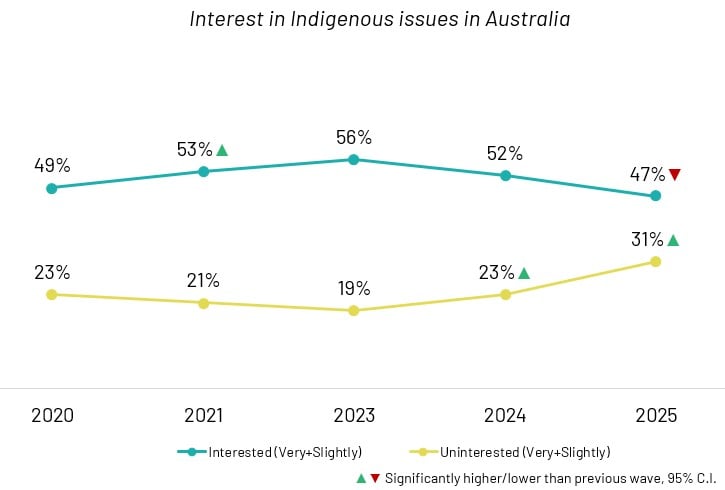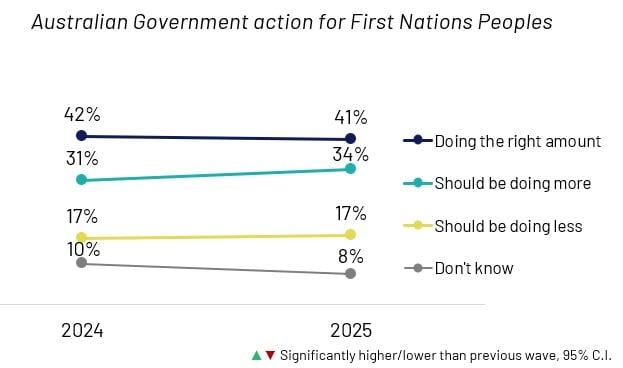Australians’ interest in Indigenous issues has fallen to its lowest point in five years, with a sharp generational divide and declining support for symbolic gestures such as Acknowledgements of Country and traditional place names.
That’s according to the Indigenous Issues 2025 report released today by Ipsos, which surveyed 942 adults nationwide between 23–27 April 2025. The annual study tracks perceptions around First Nations recognition, government performance and reconciliation initiatives.
Public interest drops, particularly among older Australians
Just 47 per cent of Australians now say they are interested in Indigenous issues, down from 56 per cent in 2023, when public engagement peaked around the Voice to Parliament referendum.
At the same time, the share of Australians who are uninterested has jumped to 31 per cent, a significant increase from 23 per cent last year. This trend reflects what Ipsos calls a “fatigue” effect following intense debate around constitutional recognition.
Support for symbolic gestures continues to decline
The report shows waning support for symbolic reconciliation measures. Just 39 per cent support Acknowledgements of Country, down from 44 per cent in 2024, and only 35 per cent support using traditional place names, compared to 38 per cent the year prior.
In contrast, initiatives tied to education and tangible outcomes continue to resonate more strongly with the public, particularly among younger Australians.
Government action remains a point of tension
Despite the drop in overall interest, a growing number of Australians want to see more action from government. In 2025, 34 per cent of respondents said the government should be doing more for First Nations people, up from 31 per cent last year.
That view is strongest among 18–29-year-olds, where 45 per cent believe the government should be doing more.
Modern racism and misperceptions persist
The report also explores the role of “modern racism”, a term used to describe covert, socially acceptable forms of discrimination, which Ipsos says remains a major barrier to reconciliation.
These attitudes not only drive resistance to change but also contribute to a “false consensus” where people mistakenly believe their views are widely shared.
Younger Australians driving hope for change
While national interest has declined, Ipsos highlights the continuing strength of younger generations’ engagement with First Nations issues. According to Nonie Finlayson, Ipsos Australia Public Affairs Research Director, this demographic could play a key role in reinvigorating reconciliation efforts.
“Many Australians appear to be experiencing fatigue around Indigenous issues,” Finlayson said. “However, the strong engagement of younger generations offers hope for the future of reconciliation efforts. Their higher levels of interest, cultural sensitivity and support for government action suggest that focusing on youth engagement could help reinvigorate the reconciliation agenda.”
Support for changing Australia Day remains low
Support for changing the date of Australia Day remains a minority position. In 2025, 46 per cent of Australians said they disagreed with changing the date, while 23 per cent were in favour. Among young adults, that figure rises to 35 per cent.
The Indigenous Issues 2025 study was conducted without external sponsorship. Ipsos notes the results carry a credibility interval of ±3.5 percentage points.


